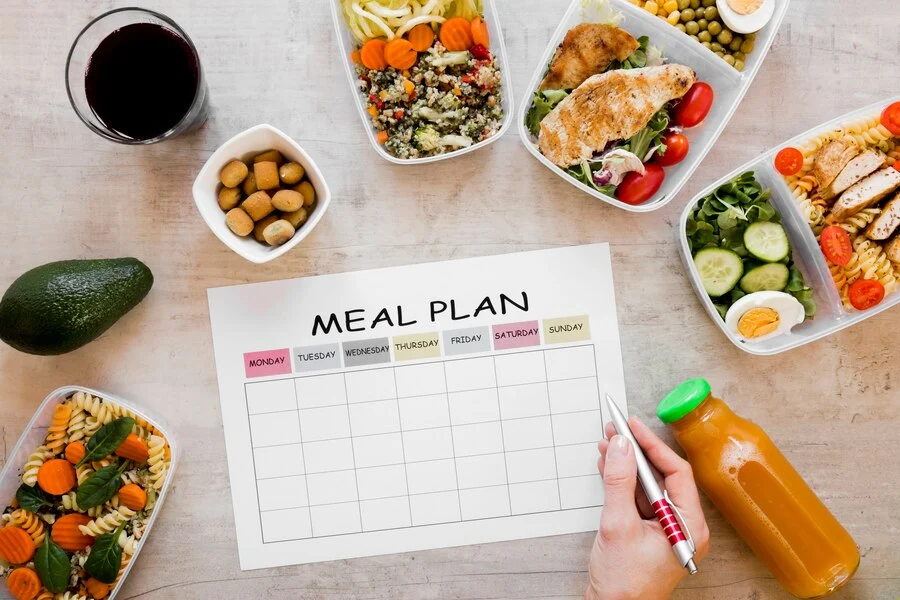Setting out on the journey through menopause? Learn how the Menopause Diet, a well-crafted 5-day plan, can assist you in losing weight and grasping this transformative stage of life with imperativeness and well-being.
Menopause is a common phase that comes in every woman’s life, marking the end of a woman’s reproductive cycle. Whereas it’s a noteworthy move, it’s not without its challenges.
One of the common issues ladies confront amid menopause is weight gain, especially around the stomach area.
Hormonal changes, reduced digestion system, and lifestyle all play a part in this. However, a well-structured diet chart can offer assistance in overseeing weight and reducing a few of the other side effects related to menopause.
In this article, we’ll discover the Menopause Diet – a 5-day plan to lose weight outlined to assist ladies in exploring this phase of life while keeping up a sound weight and healthy body.
Understanding Menopause and Weight Gain
Hormonal Changes
Amid menopause, a woman’s ovaries continuously halt creating estrogen and progesterone. These hormonal changes can have a significant effect on her body.
One key impact may be a diminish in estrogen levels, which can lead to an increment in belly fat. Estrogen makes a difference in controlling body weight, and when it decreases, fat tends to be redistributed from the hips and thighs to the stomach/abdominal area.
Slowed Digestion system
The digestion system is the method by which the body changes from food into vitality it decreases with age. The reduced metabolic rate implies that the body burns fewer calories, making it less demanding to pick up weight in case dietary propensities stay unaltered. This metabolic lull can be exacerbated amid menopause, making it indeed more pivotal to embrace a sound eating plan.
Muscle Loss
As women age, they tend to involve a common loss of muscle mass, a condition known as sarcopenia. Muscle tissue is more metabolically dynamic than fat, so the lessening in muscle mass can contribute to a slower digestion system. To counter this, it’s vital to join strength-training works out into your schedule to build and keep up muscle.
Insulin Resistance
Numerous women encounter insulin resistance in menopause. Insulin is a hormone that controls blood sugar levels. resistance implies that the body’s cells don’t react successfully to insulin, coming about in higher blood sugar levels. This could contribute to weight gain, especially within the belly area, and increase the chance of creating type 2 diabetes.
The Menopause Diet: A 5-Day Plan To Lose Weight

The Menopause Count calories focus on adjusted, nutritious eating that can offer assistance to oversee weight and diminish the seriousness of menopausal indications. It’s basic to join an assortment of foods that address the particular needs of menopausal ladies. Here’s a 5-day day diet arranged to urge you to begin:
Hormone-Balancing Breakfast
Greek yogurt is a fabulous choice for the primary meal of the day. It gives a sound dosage of probiotics, which can bolster intestine wellbeing and is rich in protein. The expansion of flaxseeds offers fiber and omega-3 greasy acids, known for their anti-inflammatory properties.
Day 1:
Breakfast: Greek Yogurt Parfait: Greek yogurt with berries, flaxseeds, and a sprinkle of nectar.
Lunch: Quinoa serving of mixed greens with blended vegetables and a lemon-tahini dressing.
Supper: Barbecued salmon with steamed broccoli and quinoa.
Lean Protein Day
Protein is fundamental for keeping up muscle mass and keeping you feeling full. Turkey and avocado lettuce wraps are a low-carb, high-protein lunch alternative. Avocado produces monounsaturated fats and is rich in potassium, which can offer assistance in combat water maintenance, a common complaint amid menopause.
Day 2:
Breakfast: Mixed eggs with spinach and tomatoes.
Lunch: Turkey and avocado lettuce wrap.
Supper: Prepared chicken breast with asparagus and a side of brown rice.
Fiber-Rich Choices
Cereal may be a fiber-rich breakfast option. Fibre makes a difference in direct absorption and can offer assistance in overseeing blood sugar levels. Chia seeds, utilized as a topping, are a superfood that gives omega-3 greasy acids, protein, and antioxidants.
Day 3:
Breakfast: Steel-cut oats with cut bananas and a sprinkle of chia seeds.
Lunch: Lentil and vegetable soup with a blended green serving of mixed greens.
Supper: Barbecued tofu with stir-fried blended vegetables and quinoa.
Anti-Inflammatory Foods
Consolidating anti-inflammatory foods into your diet can offer assistance in reducing menopausal symptoms like joint torment and hot flashes.
Day 4:
Breakfast: Chia seeds drenched in almond milk with a topping of blended berries.
Lunch: Spinach and kale serving of mixed greens with flame-broiled shrimp and a citrus vinaigrette.
Dinner: Prepared cod with simmered Brussels grows and sweet potatoes.
Whole Grains and Sound Fats
Whole grains offer a consistent source of vitality and can offer assistance in controlling blood sugar levels. Avocado, a central component of the avocado toast breakfast, gives monounsaturated fats, which are heart-healthy and can offer assistance in decreasing irritation.
Day 5:
Breakfast: Avocado Toast, Whole-grain toast topped with avocado and poached eggs.
Lunch: Quinoa and dark bean bowl with salsa and guacamole.
Supper: Incline hamburger stir-fry with broccoli, chime peppers, and brown rice.
If you are a fitness freak looking to explore different diet methods, then don’t forget to check out ABC Diet on our website.
Additional Tips
Consolidate Calcium and Vitamin D:
Menopausal ladies are at a better hazard of bone thickness misfortune. To bolster bone wellbeing, guarantee a satisfactory admission of calcium and vitamin D. Great sources incorporate dairy items, braced non-dairy drain, verdant greens, and daylight for vitamin D.
Careful Eating:
Pay attention to your body’s starvation and completion prompts. Hone mindful eating to savor each food, which can avoid gorging and offer assistance with weight administration.
Stress Management:
Stress, depression, anxiety, etc can worsen menopause and contribute to weight gain. Consolidate stress-reduction strategies such as meditation, yoga, profound breathing exercises, or hobbies you should follow to maintain emotional well-being.
Restrain Liquor and Caffeine:
Intemperate alcohol and caffeine utilization can disturb the whole metabolic process and influence hormonal adjustments. It’s better to stay away from all these refreshments.
Normal Check-ups:
Schedule regular health check-ups to screen your overall health and examine any concerns together with your doctor. They can assist you in addressing particular menopausal side effects and give personalized direction.
Take Rest:
Hormonal changes amid menopause can lead to rest unsettling influences. Keep up a steady rest plan, make a comfortable rest environment, and hone great rest cleanliness to guarantee tranquil evenings.
Physical Activities
Engage in customary physical movement, counting both a cardiovascular workout and quality preparation. Working out makes a difference in keeping up muscle mass, underpins the digestion system, and diminishes the hazard of osteoporosis.
Hydration:
Drinking a satisfactory amount of water is fundamental for keeping up overall health and supporting the body’s natural detoxification forms.
Maintain a journal:
Write your daily food intake in a diary or employing a versatile app can assist you in recognizing designs and making vital alterations to your diet. It moreover serves as an instrument for responsibility.
Social Sharing:
Sharing your menopause journey with companions, family, or community can give emotional support and motivation. It’s simpler to preserve a healthy way of life if you have a support system.
Teach Yourself:
Understanding the changes your body is going through amid menopause can engage you to create informed choices for your health and well-being. Remain educated and look for trustworthy sources of data.
Keep in mind, that the Menopause Diet isn’t about losing weight; it’s advancing your general well-being amid a noteworthy life move. Tailor your diet to your personal needs and inclinations, and do not hesitate to look for direction from a doctor or an experienced dietitian for personalized recommendations.
Final Thoughts
Menopause could be a transformative stage in a woman’s life, but it doesn’t need to be synonymous with weight gain and distress. This Menopause diet 5-day plan offers an organized approach to lose weight while taking care of overall well-being. Amid this move. Keep in mind that the key to victory is consistency and keeping up a healthy way of lifestyle.
You should have soy, flaxseeds, and whole grains which are loaded with phytoestrogens. It can help with alleviating hot flashes. Apart from that you should avoid spicy foods and try to keep your body hydrated as much as you can.
Yes, As we all know calcium and vitamin D are responsible for maintaining good bone health. So it’s very crucial to add food rich in that to keep your bones healthy. You can add dairy products, and leafy greens to your diet.
Women tend to gain weight during menopause, So it’s very crucial to include well-balanced nutritional-rich foods in your diet for better weight management regular exercise can be done regularly.
Yes, some foods help to boost your mind and can lift your mood. Incorporate foods like flaxseeds, walnuts, fish, etc. So basically food rich in omega-3 and fatty acids may help you with mood swings and irritability.
Incorporate heart-healthy foods like avocados, nuts, olive oil, fiber-rich foods, and foods with omega-3 fatty acids to support cardiovascular health during menopause.



